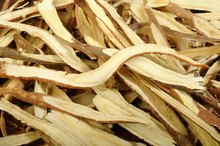Side Effects of Rhubarb
The stalk of the rhubarb plant is used as both a food and medicinal supplement. Health applications of rhubarb supplements include relief of constipation, stomach ulcers, skin sores, and menopausal and allergy symptoms. More research is needed to examine these purported health benefits of rhubarb in humans. As a food, rhubarb is deemed safe and doesn't cause side effects. At larger, therapeutic dosages, however, rhubarb may cause mild to severe health problems. Before taking rhubarb as a supplement, seek additional guidance from your medical provider.
Upset Stomach
Due to its laxative effects, rhubarb may cause stomach discomfort, nausea, vomiting or diarrhea in certain people. Diarrhea may be accompanied by abdominal cramping, bloating or appetite loss. Prolonged episodes of diarrhea may increase your risk of becoming dehydrated. Talk with your doctor if stomach discomfort persists or if you experience diarrhea for more than two or three days.
- Due to its laxative effects, rhubarb may cause stomach discomfort, nausea, vomiting or diarrhea in certain people.
- Prolonged episodes of diarrhea may increase your risk of becoming dehydrated.
Severe Side Effects
Side Effects of Deglycyrrhizinated Licorice
Learn More
If you use rhubarb medicinally for longer than eight days, you may be at risk of developing severe side effects. Long-term treatment with rhubarb may result in bone loss, weakness, potassium loss and heart rate irregularities. Rhubarb also contains high concentrations of oxalic acid, a chemical associated with the development of kidney stones. Contact your physician if you experience body aches, weakness, sudden or severe back or abdominal pain, dizziness or heart rate changes to ensure you receive prompt and appropriate care.
- If you use rhubarb medicinally for longer than eight days, you may be at risk of developing severe side effects.
- Long-term treatment with rhubarb may result in bone loss, weakness, potassium loss and heart rate irregularities.
Contraindications
Treatment with rhubarb isn't appropriate for everyone. Women who are pregnant shouldn't use rhubarb medicinally because this supplement may cause uterine contractions. Avoid treatment with rhubarb if you have a personal history of liver disease, arthritis, bowel disease or obstruction, or kidney-related health problems including kidney stones. In addition, people with hormone-sensitive health problems, such as ovarian cancer or uterine fibroids, shouldn't take rhubarb because this supplement may have estrogen-like effects on the human body.
- Treatment with rhubarb isn't appropriate for everyone.
- In addition, people with hormone-sensitive health problems, such as ovarian cancer or uterine fibroids, shouldn't take rhubarb because this supplement may have estrogen-like effects on the human body.
Drug Interactions
Side Effects of HCL Supplements
Learn More
Rhubarb supplements may interfere with your body's ability to absorb medications you take orally. You may be at an increased risk of developing low potassium levels if you take rhubarb in conjunction with digoxin, diuretics or corticosteroids. Avoid taking rhubarb if you're also using warfarin, a blood thinner, because this treatment combination may increase your risk of bleeding. In addition, do not take rhubarb with other laxatives or medications that may harm your kidneys, such as ibuprofen, naproxen and cyclosporine.
- Rhubarb supplements may interfere with your body's ability to absorb medications you take orally.
- In addition, do not take rhubarb with other laxatives or medications that may harm your kidneys, such as ibuprofen, naproxen and cyclosporine.
Related Articles
References
- Drugs.com: Rhubarb
- Memorial Sloan-Kettering Cancer Center: Rhubarb
- A Modern Herbal: Rhubarb
- Rhubarb, raw. FoodData Central. U.S. Department of Agriculture. Published April 1, 2019.
- Kaczmarczyk MM, Miller MJ, Freund GG. The health benefits of dietary fiber: Beyond the usual suspects of type 2 diabetes mellitus, cardiovascular disease and colon cancer. Metabolism. 2012;61(8):1058–1066. doi:10.1016/j.metabol.2012.01.017
- Yang J, Wang HP, Zhou L, Xu CF. Effect of dietary fiber on constipation: A meta analysis. World J Gastroenterol. 2012;18(48):7378–7383. doi:10.3748/wjg.v18.i48.7378
- Kunzmann AT, Coleman HG, Huang WY, Kitahara CM, Cantwell MM, Berndt SI. Dietary fiber intake and risk of colorectal cancer and incident and recurrent adenoma in the prostate, lung, colorectal, and ovarian cancer screening trial. Am J Clin Nutr. 2015;102(4):881–890. doi:10.3945/ajcn.115.113282
- Lattimer JM, Haub MD. Effects of dietary fiber and its components on metabolic health. Nutrients. 2010;2(12):1266–1289. doi:10.3390/nu2121266
- Evert AB, Boucher JL, Cypress M, et al. Nutrition therapy recommendations for the management of adults with diabetes. Diabetes Care. 2014;37 Suppl 1:S120-43. doi:10.2337/dc14-S120
- Vitamin K. Fact Sheet for Consumers. National Institutes of Health Office of Dietary Supplements. Updated: February 24, 2020
- Rhubarb. Memorial Sloan Kettering Cancer Center. About Herbs, Botanicals & Other Products. Updated February 15, 2019
- Rhubarb. Natural Medicine Database. Therapeutic Research Center. Updated 12/18/2019
Resources
Writer Bio
Rae Uddin has worked as a freelance writer and editor since 2004. She specializes in scientific journalism and medical and technical writing. Her work has appeared in various online publications. Uddin earned her Master of Science in integrated biomedical sciences with an emphasis in molecular and cellular biochemistry from the University of Kentucky College of Medicine.









